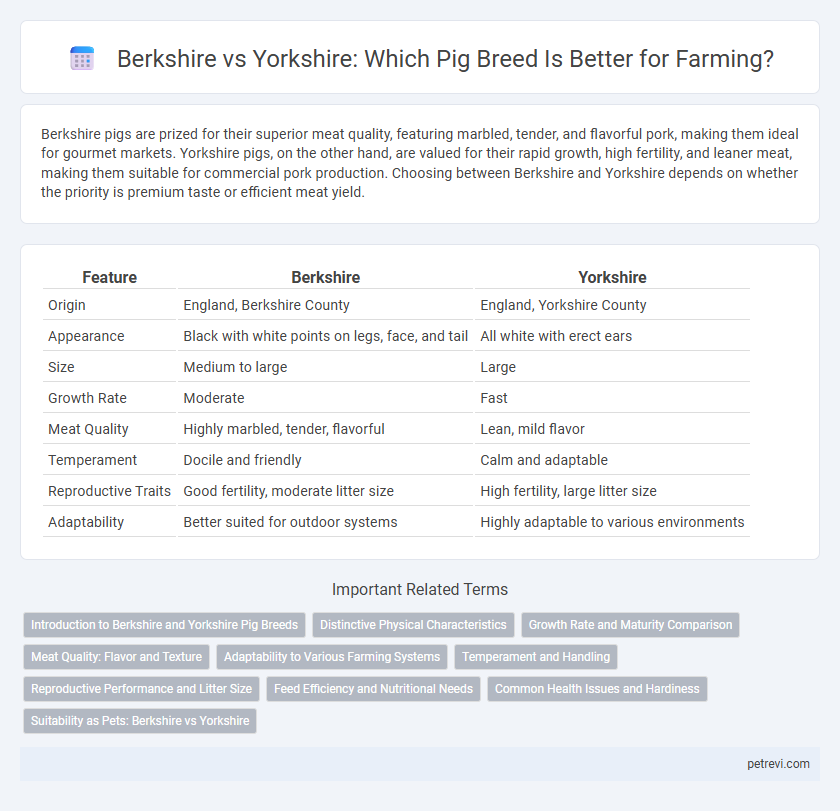Berkshire pigs are prized for their superior meat quality, featuring marbled, tender, and flavorful pork, making them ideal for gourmet markets. Yorkshire pigs, on the other hand, are valued for their rapid growth, high fertility, and leaner meat, making them suitable for commercial pork production. Choosing between Berkshire and Yorkshire depends on whether the priority is premium taste or efficient meat yield.
Table of Comparison
| Feature | Berkshire | Yorkshire |
|---|---|---|
| Origin | England, Berkshire County | England, Yorkshire County |
| Appearance | Black with white points on legs, face, and tail | All white with erect ears |
| Size | Medium to large | Large |
| Growth Rate | Moderate | Fast |
| Meat Quality | Highly marbled, tender, flavorful | Lean, mild flavor |
| Temperament | Docile and friendly | Calm and adaptable |
| Reproductive Traits | Good fertility, moderate litter size | High fertility, large litter size |
| Adaptability | Better suited for outdoor systems | Highly adaptable to various environments |
Introduction to Berkshire and Yorkshire Pig Breeds
Berkshire pigs are known for their high-quality, marbled meat with exceptional tenderness and flavor, making them a premium choice in pork production. Yorkshire pigs, also called Large White, are valued for their rapid growth, large litter sizes, and adaptability to various farming systems, contributing to their popularity worldwide. Both breeds play significant roles in commercial pig farming, with Berkshire prized for specialty pork and Yorkshire favored for efficiency and productivity.
Distinctive Physical Characteristics
Berkshire pigs are characterized by their black coat with distinct white points on the legs, face, and tail, along with a short, dished snout and erect ears. Yorkshire pigs exhibit a uniform white coat, long, slightly disayed snout, and large, floppy ears that distinguish them. These physical traits contribute to breed identification and influence their suitability for different farming environments.
Growth Rate and Maturity Comparison
Berkshire pigs exhibit a moderate growth rate with a tendency to mature slightly slower than Yorkshire pigs, which are known for their rapid growth and early maturity. Yorkshire pigs typically reach market weight faster due to their efficient feed-to-gain ratio and leaner body composition. The comparative growth efficiency of Yorkshire breeds often makes them the preferred choice for commercial pork production focused on quick turnover.
Meat Quality: Flavor and Texture
Berkshire pigs are renowned for their exceptional marbling, resulting in tender, juicy meat with a rich, savory flavor highly prized in gourmet markets. Yorkshire pigs produce leaner meat with a mild taste and a firmer texture, making them popular for versatile cooking applications. The superior intramuscular fat content in Berkshire pork enhances succulence and flavor depth compared to the leaner, slightly drier texture of Yorkshire pork.
Adaptability to Various Farming Systems
Berkshire pigs exhibit exceptional adaptability to diverse farming systems, thriving in both intensive and extensive environments due to their robust health and foraging ability. Yorkshire pigs are highly versatile, favored in commercial operations for their rapid growth and efficient feed conversion across indoor and outdoor setups. Both breeds demonstrate significant flexibility, but Berkshires excel in pasture-based systems while Yorkshires perform optimally under controlled, high-input conditions.
Temperament and Handling
Berkshire pigs are known for their docile temperament, making them easier to handle and well-suited for small-scale farming environments. Yorkshire pigs, while generally calm, can be more energetic and require experienced handlers for effective management. Both breeds respond well to consistent, gentle handling, but Berkshire pigs often exhibit more predictable behavior under stress.
Reproductive Performance and Litter Size
Berkshire pigs are known for their moderate reproductive performance with an average litter size of 7 to 9 piglets, offering strong maternal instincts and high-quality meat production. Yorkshire pigs, on the other hand, excel in reproductive efficiency, consistently producing larger litters averaging 10 to 12 piglets per farrowing and exhibiting strong maternal traits that contribute to higher piglet survival rates. The choice between Berkshire and Yorkshire for breeding largely depends on whether the priority is superior meat quality or maximizing litter size and reproductive output.
Feed Efficiency and Nutritional Needs
Berkshire pigs exhibit superior feed efficiency compared to Yorkshire pigs, requiring less feed to gain equivalent weight, which optimizes production costs. Nutritionally, Berkshires demand a protein-rich diet to support their faster muscle growth and marbling qualities, while Yorkshires benefit from balanced energy and fiber intake to maintain their leaner physique. Understanding these differences aids in formulating precise feeding strategies to maximize growth performance and meat quality for each breed.
Common Health Issues and Hardiness
Berkshire pigs are generally more susceptible to respiratory issues and obesity-related health problems due to their slower metabolism and thicker fat layers, whereas Yorkshire pigs exhibit greater resistance to common swine diseases like swine influenza and porcine reproductive and respiratory syndrome (PRRS), making them hardier in diverse environmental conditions. Yorkshire breeds adapt better to intensive farming systems and show higher survivability in fluctuating climates, while Berkshires require more controlled environments to maintain optimal health. Selecting Yorkshire pigs may reduce veterinary costs and improve herd robustness, whereas Berkshires are favored for premium meat quality but need vigilant health management.
Suitability as Pets: Berkshire vs Yorkshire
Berkshire pigs, known for their calm temperament and smaller size, are often more suitable as pets compared to Yorkshire pigs, which tend to be larger and more active. The Berkshire's friendly nature and manageable growth make them ideal for family environments and smaller homesteads. Yorkshire pigs require more space and exercise, better fitting for farm settings rather than typical pet scenarios.
Berkshire vs Yorkshire for Pig breed Infographic

 petrevi.com
petrevi.com